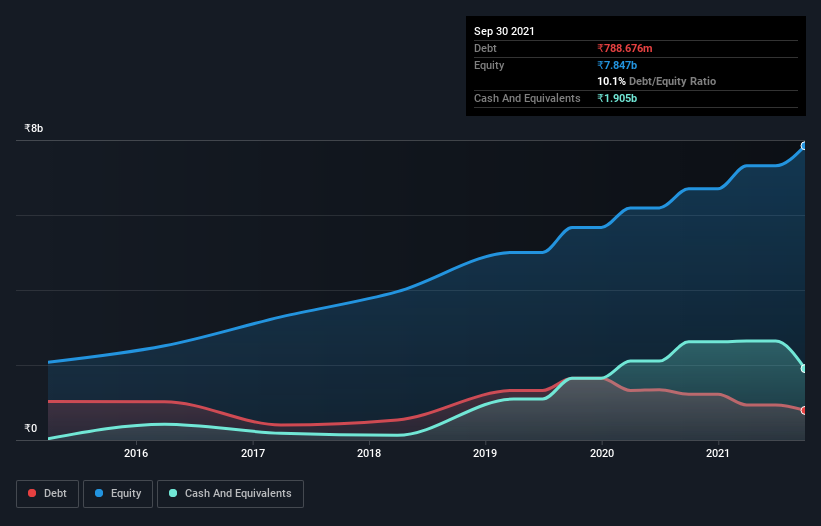Here's Why Fine Organic Industries (NSE:FINEORG) Can Manage Its Debt Responsibly
David Iben put it well when he said, 'Volatility is not a risk we care about. What we care about is avoiding the permanent loss of capital.' It's only natural to consider a company's balance sheet when you examine how risky it is, since debt is often involved when a business collapses. As with many other companies Fine Organic Industries Limited (NSE:FINEORG) makes use of debt. But should shareholders be worried about its use of debt?
When Is Debt Dangerous?
Debt and other liabilities become risky for a business when it cannot easily fulfill those obligations, either with free cash flow or by raising capital at an attractive price. Part and parcel of capitalism is the process of 'creative destruction' where failed businesses are mercilessly liquidated by their bankers. However, a more usual (but still expensive) situation is where a company must dilute shareholders at a cheap share price simply to get debt under control. Of course, debt can be an important tool in businesses, particularly capital heavy businesses. The first thing to do when considering how much debt a business uses is to look at its cash and debt together.
See our latest analysis for Fine Organic Industries
How Much Debt Does Fine Organic Industries Carry?
You can click the graphic below for the historical numbers, but it shows that Fine Organic Industries had ₹788.7m of debt in September 2021, down from ₹1.22b, one year before. However, its balance sheet shows it holds ₹1.90b in cash, so it actually has ₹1.12b net cash.

A Look At Fine Organic Industries' Liabilities
The latest balance sheet data shows that Fine Organic Industries had liabilities of ₹2.00b due within a year, and liabilities of ₹439.0m falling due after that. On the other hand, it had cash of ₹1.90b and ₹2.46b worth of receivables due within a year. So it can boast ₹1.92b more liquid assets than total liabilities.
This state of affairs indicates that Fine Organic Industries' balance sheet looks quite solid, as its total liabilities are just about equal to its liquid assets. So while it's hard to imagine that the ₹111.2b company is struggling for cash, we still think it's worth monitoring its balance sheet. Succinctly put, Fine Organic Industries boasts net cash, so it's fair to say it does not have a heavy debt load!
The good news is that Fine Organic Industries has increased its EBIT by 3.6% over twelve months, which should ease any concerns about debt repayment. There's no doubt that we learn most about debt from the balance sheet. But it is future earnings, more than anything, that will determine Fine Organic Industries's ability to maintain a healthy balance sheet going forward. So if you want to see what the professionals think, you might find this free report on analyst profit forecasts to be interesting.
Finally, a business needs free cash flow to pay off debt; accounting profits just don't cut it. While Fine Organic Industries has net cash on its balance sheet, it's still worth taking a look at its ability to convert earnings before interest and tax (EBIT) to free cash flow, to help us understand how quickly it is building (or eroding) that cash balance. In the last three years, Fine Organic Industries's free cash flow amounted to 30% of its EBIT, less than we'd expect. That's not great, when it comes to paying down debt.
Summing up
While it is always sensible to investigate a company's debt, in this case Fine Organic Industries has ₹1.12b in net cash and a decent-looking balance sheet. On top of that, it increased its EBIT by 3.6% in the last twelve months. So we are not troubled with Fine Organic Industries's debt use. The balance sheet is clearly the area to focus on when you are analysing debt. But ultimately, every company can contain risks that exist outside of the balance sheet. We've identified 1 warning sign with Fine Organic Industries , and understanding them should be part of your investment process.
When all is said and done, sometimes its easier to focus on companies that don't even need debt. Readers can access a list of growth stocks with zero net debt 100% free, right now.
New: AI Stock Screener & Alerts
Our new AI Stock Screener scans the market every day to uncover opportunities.
• Dividend Powerhouses (3%+ Yield)
• Undervalued Small Caps with Insider Buying
• High growth Tech and AI Companies
Or build your own from over 50 metrics.
Have feedback on this article? Concerned about the content? Get in touch with us directly. Alternatively, email editorial-team (at) simplywallst.com.
This article by Simply Wall St is general in nature. We provide commentary based on historical data and analyst forecasts only using an unbiased methodology and our articles are not intended to be financial advice. It does not constitute a recommendation to buy or sell any stock, and does not take account of your objectives, or your financial situation. We aim to bring you long-term focused analysis driven by fundamental data. Note that our analysis may not factor in the latest price-sensitive company announcements or qualitative material. Simply Wall St has no position in any stocks mentioned.
About NSEI:FINEORG
Fine Organic Industries
Engages in manufacture, processing, supply, distribution, dealing, import, and export of oleochemical-based additives in India and internationally.
Flawless balance sheet with limited growth.
Market Insights
Community Narratives




